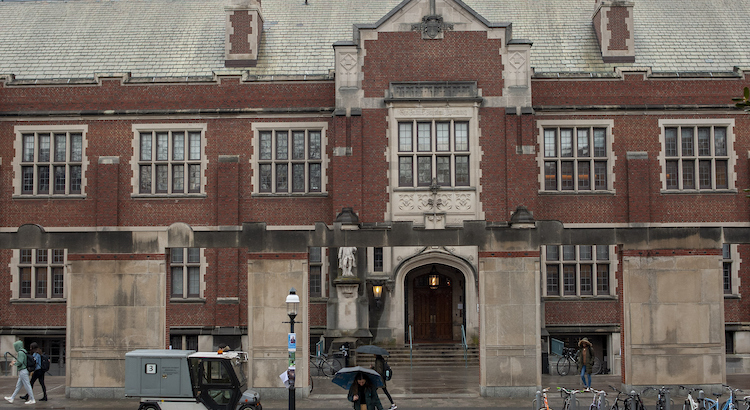David Piegaro fell down the stairs outside a Princeton University building and rolled painfully to the bottom. That’s when he was handcuffed and put under arrest for aggravated assault. The supposed victim was Kenneth Strother, the university’s head of security—who had, according to video of the incident and witness testimony—caused Piegaro to fall down those stairs. Strother was unharmed. Piegaro faced jail time.
On Tuesday, Piegaro was acquitted. On Thursday, Princeton revealed it still had some salt to pour into Piegaro’s wounds. The university honored Strother with its President’s Achievement Award for his “commitment to excellence and exceptional performance.”
As outrageous as it sounds, these details only scratch the surface. Piegaro is Jewish, and the confrontation happened when he was filming an April 2024 pro-Palestinian demonstration in which 13 students occupied a building while hundreds of their supporters protested outside and then tried to prevent police from making arrests. Among the signs held by students at the demonstration were one with the logo of the Popular Front for the Liberation of Palestine, a designated terrorist group that took part in the Oct. 7 slaughter. There was also a Hezbollah flag.
The 13 anti-Zionist occupiers were charged with trespassing—nothing approaching the seriousness of the charge against Piegaro. The trespassers are “unlikely to face penalties from Princeton greater than probation.” According to the school newspaper, “faculty members voted 154-136 in favor of granting amnesty to the students at a special meeting held at Richardson Auditorium.” (Such a vote isn’t binding on the university but it serves to show the wide faculty support for the lawbreaking anti-Zionists.) The students’ lawyer is trying to get the charges dropped in exchange for community service.
Even the school gave them some official measure of support. “[T]he university has consistently said that it supports an outcome that would minimize the impact of the arrest on these individuals,” a spokeswoman told the New York Times.
What about Piegaro? “The university has no comment.”
Piegaro’s was the case the school might actually have been able to do something about. After all, his altercation was with a university employee. Still, Princeton made clear the Jewish pro-Israel student was on his own.
The students who occupied the building that night were accused of “abusive” behavior toward university staff by the vice president for campus life, Rochelle Calhoun, who characterized the protest as “unlawful behavior that created a dangerous situation.” Yet the occupiers received an outpouring of support from the school. More than 100 faculty members signed an open letter accusing Calhoun of using the “colonial” tactics of “repression and vilification” against the students.
After viewing the parts of the Piegaro incident that were captured on video, it isn’t surprising the court ruled in his favor. Strother and two other men—according to testimony, the men were faculty advisors helping the pro-Palestinian demonstrators—are seen walking up the steps to the door of a building. Piegaro asks Strother his name and affiliation with the university. Strother ignores him until Piegaro goes to enter the building along with Strother and the others. Strother then appears to put out an arm to stop Piegaro. Piegaro is heard saying “don’t touch me” and the video ends as, according to witnesses, Piegaro tumbled down the stairs. A fellow student said she saw Strother holding Piegaro “like an open pair of scissors” and then drop him, the Times reported. Strother claimed Piegaro initiated contact but confirmed he grabbed Piegaro and then accidentally dropped him down the stairs.
The judge in the case ruled that Piegaro had shown poor judgment but had done nothing that amounted to assault.
And what does the school think of Strother’s job performance? “Ken approaches this complex task in a human-centric way, building relationships that foster transparency, trust, and understanding, and are shaped by his personal integrity and strategic vision,” the school said in announcing Strother’s award. A dean at the school added, presumably without irony: “I often see Ken interact with the most impassioned groups and individuals, when emotions run high… Yet, even in these most challenging situations, I’ve observed Ken demonstrate the most incredible degree of patience, grace and diplomacy.”
Piegaro’s case attracted no media outrage. No free-speech groups rushed to his side. No US senators protested his arrest, as they have done for pro-Palestinian activists. The Princeton administration, Piegaro’s fellow students, activists who claim to be outraged by police action against protesters, the legion of free-speech warriors who appear to apply their principles selectively—no one seemed to have much to say about Piegaro.
Indeed, Piegaro himself may have put it best, not just for himself but for the wider Jewish community in the post-Oct. 7 world. According to the transcript of a police officer’s body camera video, after Piegaro falls down the stairs he explains to the officer that he’s not with the main protests, and you can tell because he’s the one with nobody coming to his aid. “Notice they’re not swarming,” he says of the pro-Palestinian protesters who would otherwise be surrounding the cops and refusing to let the arrest happen without a fight. “It is because I’m not on their side.”


















